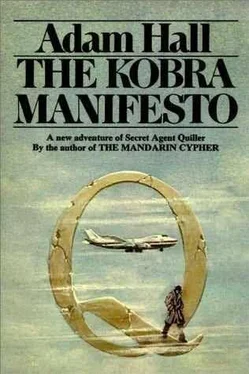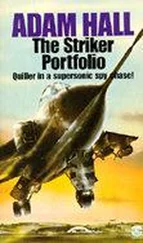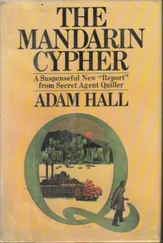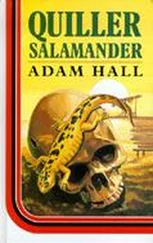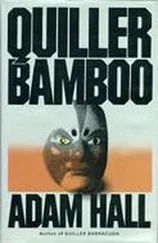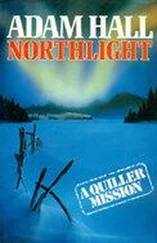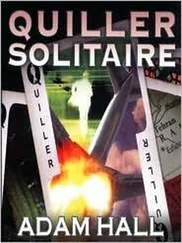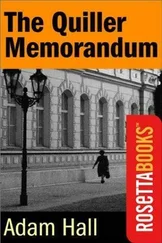Lagofondo was at me neck of a tributary: a cluster of water-front cane-and-thatch dwellings along the steep bank where the jute reeds had been hacked away to make room, with a banana grove and some farm buildings and a church. The hotel had been a German mission house during the rubber boom; it had started to rot when the slump came and had then been repaired and was starting to rot again.
A mosquito whined close and I waited for the silence, then hit the side of my head, bringing blood away on my fingers. I put the field glasses up again.
They were sitting in the shade of the palms: everyone here sat in the shade. The thermometer in the hall had been at 103° when I checked in, and the boy at the desk said it was cooler after the rain. An hour ago I had been sitting in the courtyard myself, talking to a Dutchman who was here collecting Indian artifacts for a mail order line he was running in Canada. I hadn't once looked at the group of people on the other side of the fountain: 1 didn't want to see them but I wanted them to see me, to establish the image. Zade and another man had been drinking pisco sours and the rest had asked for mineral water. They had talked now and then, but with an effort, and always led by Zade. They bad talked about the Amazon and its insects, mostly in English with strong accents.
Sometimes I had heard the soft frightened tones of the girl.
I watched her now. She was centred in the field of vision: pale, fair haired, sitting perfectly still and looking up at the others only when they spoke directly to her. The woman spoke to her more often than the others. Her name was Shadia.
I moved the glasses.
They had that vague familiarity of faces seen before only in photographs: I'd seen the photographs in London and Ferris had shown me some more on the plane between Los Angeles and Washington four days ago.
Sabri Sassine: undercover operator for the Turkish Dev-Genc, released from gaol in the Argentine. Carlos Ramirez: mercenary terrorist, explosives expert. Francisco Ventura: freelance saboteur and sometime Black September assassin, Ilyich Kuznetski: another freelance with the Simplon Tunnel bombing on his record and a gaol shoot-out in Rome. Satynovich Zade: currently wanted by the Dutch police for a political assassination reportedly undertaken for the PLA.
I didn't know who the woman was.
I knew who the college girl was.
She was sipping some water as I watched her.
The woman was talking to her now but I couldn't hear the words intelligibly. The accent was Polish. I moved the field glasses and studied her again, wiping the condensation off the lenses and steadying them with my elbows on my knees. I am a bad judge of people's age but she looked thirty-five. Sun-tan, auburn hair hanging loose, very pale blue eyes that hardly ever moved: when she wanted to look at something she turned her head, in the way of a cat Possibly she had been taken on as a chaperon for Pat Burdick but these men were terrorists and if they wanted to search the girl they would do that and if they wanted to rape her they would do that: I didn't think the woman was a chaperon. More probably she was the current partner of one of the men but in half an hour's constant surveillance I hadn't seen who he was: she hadn't touched any of them, or sat particularly close. Ten minutes ago Zade had said something to her in Polish and she had cut in quickly, turning away, and there'd been a short silence among the group.
I moved the field glasses again to watch Ramirez.
Above my head the fan droned rhythmically: the blades were out of balance and the electric motor was vibrating with each revolution. It produced a warm draught, but the sweat went on running down my face and steaming the lenses.
I wondered again what they were asking of the Defence Secretary.
He would know by now, They would have presented their terms.
The fact was that Burdick could have called in security or investigatory or counter-espionage agencies and he hadn't done that and I could see only one obvious reason: he'd been ordered not to. If this were the standard hostage-and-demands situation then the United States Secretary of Defence was at present under the orders of the five men down there in the courtyard, so long as his daughter was alive.
There was of course a difference in the standard pattern but it didn't affect the situation as such: in this case the hostage hadn't been kidnapped. Pat Burdick was studying insects along the Amazon with a few companions and probably writing home and probably sending photographs as evidence. Only two people had known the truth and one was Finberg and he was dead. The other was James Burdick.
This difference in the standard pattern was crucial. If the group had seized their hostage and concealed her whereabouts there would be nothing Burdick could do for them: the FBI and the counter-terrorist department of the CIA would have been mobilized and the group's demands would have been made public and Burdick would not have been allowed to meet them.
The demands wouldn't be for money. They would be for something only Burdick and a few men in similar positions could supply: military information, arms, technological data, access to ultra-secret documents or blueprints or designs. Pressure to supply them, in whole or in part, could be applied to the Defence Secretary only if he alone knew that his daughter's life was in jeopardy and that these demands were being made.
According to the Bureau intelligence, passed to the executive by his director in the field, Burdick alone knew.
London doesn't pass out disinformation to the people in the field. It doesn't tell you much but when it tells you something then you can believe it.
The glasses were misted up again and I lowered them and wiped them with the corner of my handkerchief. I could feel a swelling on my scalp above the ear: the blood on my fingers had been my own, drawn out by a female mosquito. There hadn't been time to ask for malaria shots but the incubation period would see me 'through the mission if the chances of survival were good enough, I didn't think they were.
This was the end-phase and there was the target: the Kobra rendezvous. When I reported to Ferris in a few minutes from now he was going to throw me the final directive and I knew what it was.
I steadied the field glasses again. The right shoulder was still inclined to ache if I kept it still too long: it had taken most of the impact when I'd hit the ground in the alley in New York. One of the group — Sassine — was moving about restlessly and I wanted to keep them all in sight in case anyone thought of coming up here to my room. They shouldn't do, because security was total: they'd never seen me before and I'd made no specific surveillance of them except from my room and behind adequate cover. But I had believed security to be total when the wall had blown out in Phnom Penh.
Note in passing: James Burdick could say nothing to anyone because his daughter's life was in hazard. The converse must also be true: his daughter had been warned that if she tried to leave the group or seek the help of the police she would bring about her father's killing.
I watched them for another fifteen minutes and then signalled Ferris.
Code-intro. No bugs.
I made my report and he started putting questions: did it look as if any exchange were to be made here in Brazil; did it look as if they were waiting for other members of the Kobra cell; did it look as if they felt on top of the situation they had created; so forth, No, no and yes.
He was silent for half a minute.
'They've still got the road up,' he said at last.
'Have they?'
Directive. He'd been in signals with London, 'This is really quite big. Quite substantial,'
Egerton's word for it I began worrying.
Читать дальше
